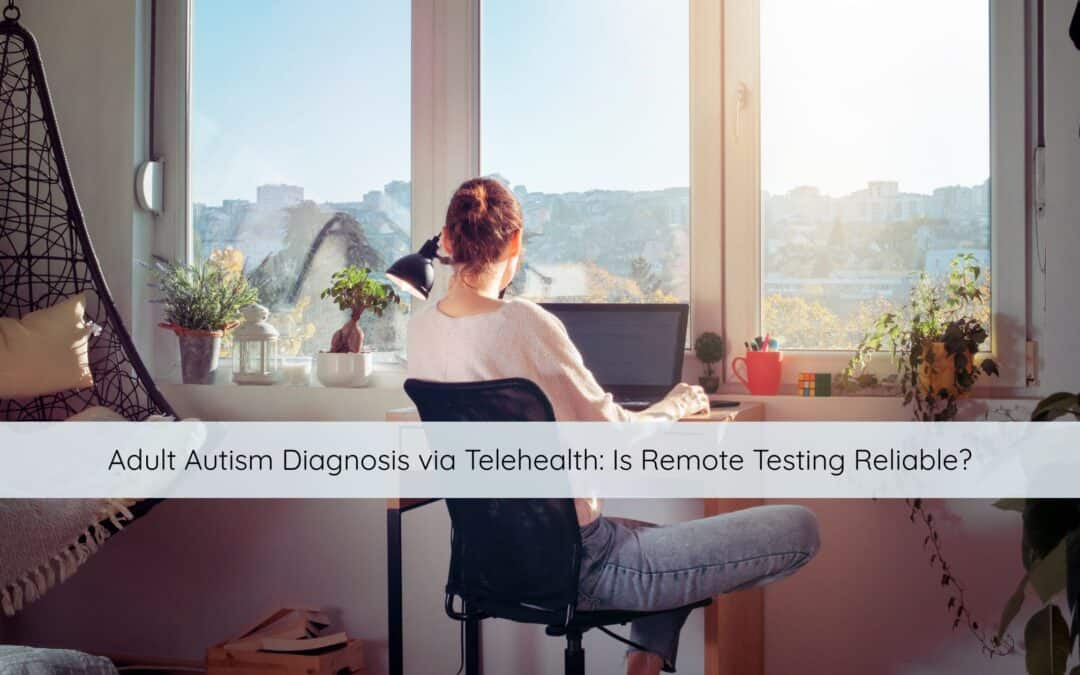If you’re an adult who’s ever quietly wondered, Could I be autistic?, you’re not alone, and you’re not imagining it. For many people, especially women, LGBTQ+ folks, and people who’ve learned to mask well, the signs of autism weren’t recognized in childhood. You might have spent years developing impressive coping strategies, only to find that parts of life still feel harder than they seem to be for everyone else.
Now, maybe you’re ready for clarity. Not because you’re broken or looking for a label, but because you’re looking to better understand how your brain works.
That process doesn’t have to be overwhelming. In fact, it doesn’t even have to involve leaving your house.
More and more adults are now pursuing remote autism assessments, and for good reason: they’re flexible, affirming, clinically sound, and especially helpful if you live far from a major city, have a busy schedule, or find traditional clinical spaces inaccessible.
Let’s break down why remote autism diagnosis works—and why it might be exactly what you’ve been needing.
Why Choose Remote Testing for Autism?
 1. Clarity from the Comfort of Your Own Space
1. Clarity from the Comfort of Your Own Space
Most adults who seek an autism assessment have already done a lot of reflection. You’ve read, researched, journaled, or spoken to others who helped you connect the dots. But translating those insights into a clinical diagnosis can feel like a leap, especially if you’re worried about “performing” in a traditional assessment setting.
Remote assessments allow you to show up in the space where you’re most yourself. There’s no pressure to navigate an unfamiliar office, no long drives or social small talk in waiting rooms. You don’t have to mask as heavily. That means we get to see more of you, which makes for a more accurate, nuanced, and useful evaluation.
2. If You Live Far from the City—You’re Not Left Out
If you live in a rural or remote area, getting a psychological assessment can be a logistical nightmare. You might have to drive hours to the nearest specialist, find childcare or time off work, and return for multiple appointments. You might be at the mercy of weather, or road conditions. For some adults, those hurdles mean putting off an assessment indefinitely, or never getting one at all.
Remote assessments eliminate that barrier. As long as you have a quiet space and a reliable internet connection, you can complete the full diagnostic process from home. That means access to care, regardless of your postal code.
You shouldn’t have to live in a city to understand your own brain.
3. It’s Not About “How Autistic You Seem” in the Moment
A common fear among adults seeking diagnosis is: What if I’m masking too well to be taken seriously?
Here’s the truth: autism assessments for adults don’t rely on a single snapshot of behavior.
We gather information from multiple sources: your life history, how you describe your experiences, standardized self-report tools, and how you process and engage in real-time. We listen for patterns: sensory sensitivities, social fatigue, deep special interests, emotional regulation, identity development, burnout, masking. It’s not about checking off a list of stereotypes. It’s about understanding you.
4. The Process Is Collaborative and Respectful
Many adults worry that an assessment will feel cold, clinical, or even dismissive—especially if they’ve had that experience before. But a good autism assessment is collaborative. It should feel like a conversation, not an interrogation.
In a remote format, we take our time. You can schedule sessions in shorter chunks, take breaks when needed, and communicate in the ways that feel most natural, whether that’s speaking openly, typing answers in the chat, or sharing examples from your writing or past experiences. You lead the way. I’ll guide the process.
 5. You Deserve to Know Yourself
5. You Deserve to Know Yourself
Getting an autism diagnosis as an adult doesn’t change who you are, it just gives you a clearer map of why you are the way you are. It can help make sense of things that never quite fit. It can offer relief, validation, and a new lens through which to view your past.
And most importantly, it can give you language for asking for what you need moving forward, whether that’s accommodations, boundaries, community, or simply more self-compassion.
Frequently Asked Questions About Remote Autism Assessment (For Adults)
Q: Can you really diagnose autism remotely?
Yes. Remote autism assessments are clinically valid when administered by trained professionals using evidence-based tools. We use structured interviews, rating scales, behavioral observations, and a thorough developmental history to build a comprehensive picture. No in-person testing required.
Q: What does the process involve?
A typical adult remote assessment includes:
- A 60–90 minute clinical interview over video
- Completion of self-report forms and rating scales (you can fill these out at your own pace)
- A video-based behavioral observation or structured conversation task
- A personalized feedback session where we review findings and recommendations
Q: What if I’ve masked so well that it won’t “show up”?
Masking is incredibly common, especially among women, queer folks, and those assigned female at birth. A good clinician knows how to look past surface presentation and explore your internal experience. We won’t just ask what you do, we’ll ask how it feels. That’s where the truth tends to live.
Q: What happens after the assessment?
You’ll receive a written report summarizing your history, findings, and any formal diagnoses. But more importantly, we’ll talk it through together in a feedback session—breaking down what it means for your life, your relationships, your past, and your next steps. You’ll leave with clarity, tools, and hopefully, a little more self-understanding.
Q: Do I have to decide right away if I want a diagnosis on paper?
No. We can talk through the pros and cons of formal diagnosis vs. informal exploration. Some people want a diagnosis to access accommodations or support; others just want to know for themselves. You are always in control of how this information is used and shared.
Final Thoughts
If you’re wondering whether remote autism assessment might be right for you, our assessment team coordinator is happy to answer questions. Getting to know yourself is not selfish. It’s healing. And it’s never too late to begin.

